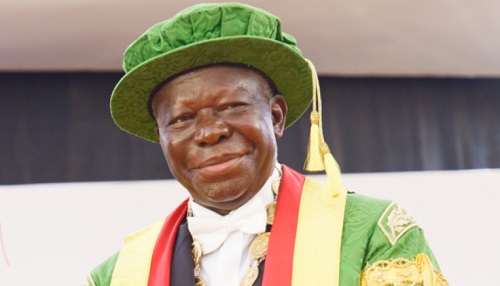The Electoral Commission (EC) has targeted to register about 1.35 million people in the 2023 Voters’ Registration exercise which commences from September 12 to October 2.
This is based on the EC’s projection that at least 1,350,000 persons might have attained 18 years since the last registration exercise in 2020.
The nationwide exercise will be conducted between 8 a.m. and 5 p.m. daily, including Saturdays and Sundays.
Announcing the dates and procedures for the exercise at a press briefing dubbed “Let the Citizen Know” in Accra yesterday, the EC Chairperson, Jean Mensa, indicated that at the time of the last registration exercise in 2020, the National Identification Authority (NIA) had registered over 10 million persons.
“Indeed, some 10 million plus persons used the Ghana Card as proof of citizenship during the 2020 elections,” she said.
She stated that, “today the NIA has on its roll close to 18 million registrants; that is eight million more persons since the 2020 Voters’ Registration exercise.”
“Per the 2021 census figures, 450,000 Ghanaians attain the age of 18 every year, and therefore qualify to be registered to vote.
“The point we seek to make is that it is highly likely that most, if not all of these 1,350,000 persons, already have the Ghana Card,” Mrs Mensa argued.
No disenfranchising
The EC chairperson said the commission did not “believe that upholding the L.I. 2111 and enforcing the use of the Ghana Card to prove a person’s citizenship would disenfranchise citizens as was being alleged by sections of our society.
“Indeed, it is in the commission’s interest to register all eligible voters and not exclude and disenfranchise them.
If any institution is keen to have a voters’ register that is credible and inclusive, it is the EC of Ghana,” she further pointed out.
Mrs Mensa said the commission took pride in the fact that the 2020 Voters’ Register duly met international standards for voters’ registration, and that 55 per cent of the country’s population was captured in it.
“You will recall that in 38 days the commission registered 17 million and 270,000 persons out of a total population of 31 million per the 2021 census figures,” the EC chair intimated.
Mrs Mensa, however, said the EC found it “unfortunate that its efforts to strengthen the credibility and integrity of our voters’ roll and by extension our elections by the introduction of this new draft C.I. did not receive the support of Parliament”.
The new draft C.I. recommends the registration of voters on a continuous basis at all district offices of the EC and also proposes the use of the Ghana Card as the sole identification of a person’s citizenship.
She expressed regret that Members of Parliament were of the view that the NIA should fully resume its registration exercise nationwide before the C.I. could be considered.
Sadly, Mrs Mensa explained that the NIA had not fully commenced its operations nationwide due to lack of resources.
That, she said, left the EC with no option than to rely on the current C.I. with its inherent weaknesses to conduct the voters’ registration exercise until such time that the NIA would become fully operational.
Expungement
Mrs Mensa said experience from the 2020 registration exercise had shown that many minors and foreigners used the window of the guarantor system and their names were found on the voters register.
With the establishment of the District Registration Review Committees (DRRCs), she explained that 40,000 minors and foreigners were challenged during the registration exercise and 15,000 names were expunged from the voters register.
Modalities, legal framework
Touching on the modalities for the voters’ registration exercise, the EC Chairperson said Article 42 of the 1992 Constitution conferred on every Ghanaian who was 18 years and above and of a sound mind the right to register and vote.
Article 45(a), she emphasised, also mandated the EC to compile the voters’ register and at such periods that might be determined by law.
“It is in the discharge of this mandate and as part of the EC’s preparation towards the conduct of the 2023 DLE that it will undertake a Voter Registration exercise,” Mrs Mensa stressed.
Proof of Eligibility
The EC Chairperson stated that registrants were required to show proof of identification by presenting the Ghana Card or the Ghana Passport, adding that those who did not have any identification documents must present two people who were already registered voters to vouch for their citizenship and age.
Procedure
On the procedure for registration, the EC Chairperson further said that registration would be done Online using the District Management System (DMS) and offline using the Biometric Voter Registration (BVR) kit.
She explained that copies of daily reports of the registration exercise from the beginning to the end would be given to political party representatives at the various registration centres, adding that each political party would be allowed to present one representative to observe the exercise.
Touching on the replacement of lost ID cards, Mrs Mensa said voters would be required to pay GH¢10, stressing that, “it is an offence for a person who has misplaced his or her card to register again”.
On issues of challenging cases, she said the procedure was the same as what pertained in the C.I.91 as amended and the DRRCs would be reconstituted to sit on all challenges.
District Level Elections
Meanwhile, the District Level Elections (DLE) will be held on Tuesday, December 19, 2023 in the 6,272 electoral areas in all the districts, with the exception of Nkoranza North and South in the Bono East Region.
The DLE for the two districts were not held for security reasons but were conducted in April 2020, and the next one to be conducted for both districts will be in 2025.
Source: GraphicOnline








